Good Beans to Eat on a Diet
When You Eat Beans Every Day, This Is What Happens To Your Body
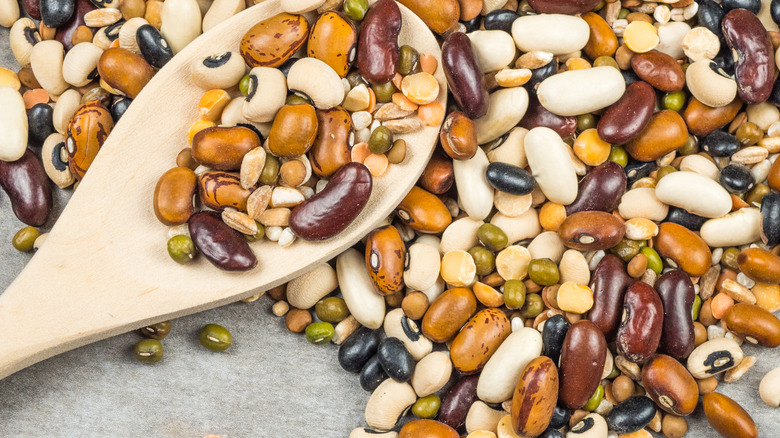
Shutterstock
Many people choose to eat beans every day, as beans are a staple food in many cultures around the world, as noted by NPR. Whether you're digging into a big bowl of black beans and rice in the Caribbean, chowing down on chana masala in India, or savoring some white bean chicken chili during winter in the United States, beans are front and center on the menu and here to stay. That's not a bad thing, either, as beans are a super healthy food with plenty of nutritional benefits.
Additionally, there's a vast array of beans to pick from when you're planning your weekly shopping trip: Kidney beans, pinto beans, chickpeas, white beans, navy beans, black beans, lima beans, and more are available in grocery stores everywhere. You can get them canned, which makes them easier to cook with, or you can purchase them dry, if you have a little bit of know-how in the kitchen. They're cheaper that way, too.
So are you someone who makes sure to eat beans at least once a day? If so, read on to find out exactly what may happen if you eat beans every day. Turns out you may want to consider beans as one of the foods you should eat every day.
You might lose weight if you eat beans every day
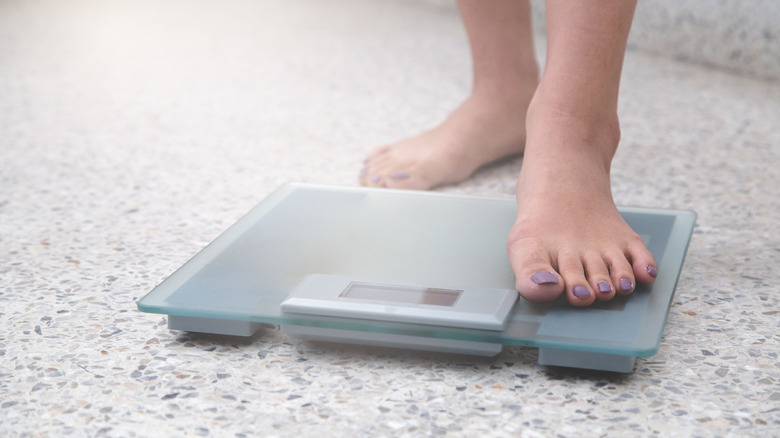
Shutterstock
According to the CDC, approximately half of all Americans are trying to lose weight, which means that one out of every two Americans are either upping our exercise game or on some kind of diet. There's certainly no shortage of diet options out there, ranging from following the keto diet to counting macros to switching to plant-based foods entirely.
While every diet doesn't necessarily include beans, chances are, if you eat beans every day, you'll drop a few pounds, says Jamie Hickey, a certified trainer and nutritionist. "Legume-based meals have been shown to be more satiating than animal based meals, probably due to the combination of fiber, protein, and slowly digested carbohydrates," he explained to The List. "Regular legume eaters have healthier body weights than those who do not eat these foods regularly, and legumes can help people lose excess weight."
So next time you're at the grocery store, instead of grabbing a steak or some ground beef, reach for a can of chickpeas instead. There are some amazing ways to use a can of chickpeas.
Trying to lower your cholesterol? Eat beans every day
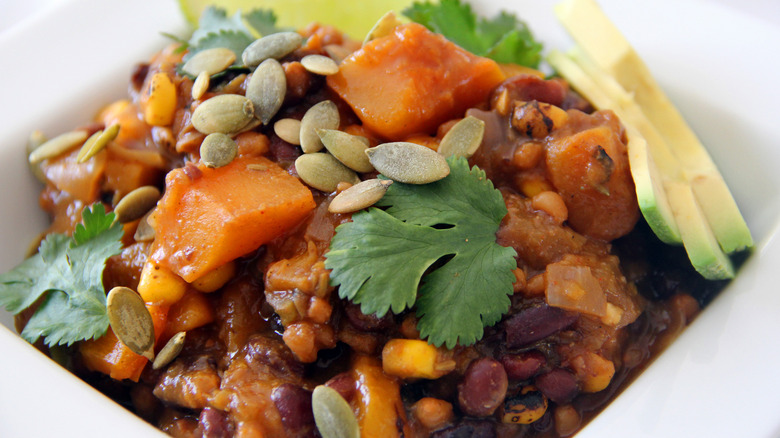
Shutterstock
Your cholesterol levels can sneak up on you, often without you realizing it, as there usually are no signs or symptoms. That's why it's super important to monitor your cholesterol levels with a blood test every four to six years (unless your doctor tells you otherwise). That way you can avoid the risks that come with having high cholesterol.
If you've found that you already have high cholesterol, or want to make sure you never get it, choosing to eat beans every day can help with that, as noted by registered dietitian Sandra Gultry. "Your LDL cholesterol levels will drop because beans are rich is soluble fiber," she told The List. "Soluble fiber attaches to cholesterol particles and takes them out of the body, helping to reduce overall cholesterol levels."
The benefits are even more abundant when you switch out the meat in your diet for beans, according to Gultry. "When beans are substituted for meat in your diet, you get the added bonus of decreased saturated fat," she continued. "Hence lowering LDL Cholesterol."
Your heart will thank you if you eat beans every day
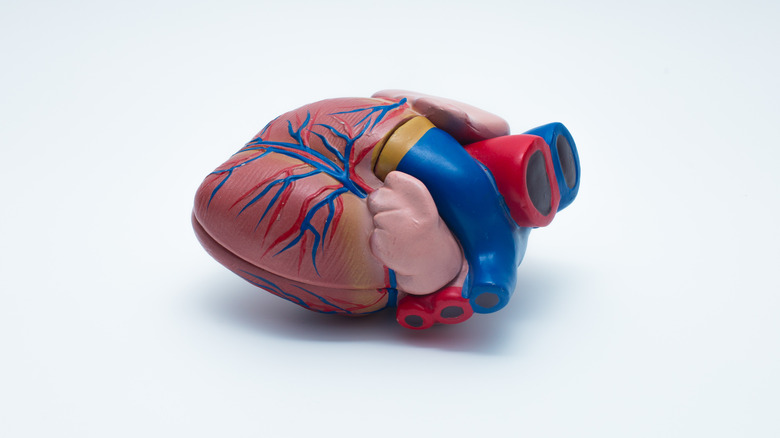
Shutterstock
Lowering your cholesterol can have an excellent impact on your heart health. How exactly does that work for people who eat beans every day? It all comes down to the soluble fiber found in them, says Kylie Ivanir, a registered dietitian. "Soluble fiber binds cholesterol in your intestine and excretes it from your body," she revealed to The List. "Therefore you absorb less cholesterol, and low cholesterol levels are key for heart health." Otherwise you'll be overly taxing your ticker, which can cause some real problems down the road.
Additionally, eating beans every day can benefit your heart in other ways as well because of the high amount of fiber in them, according to Ivanir. "The fiber keeps you fuller for longer," she continued. "So it can decrease your calorie load and cause weight loss which indirectly helps heart health."
If you eat beans every day, you might lower your risk for diabetes
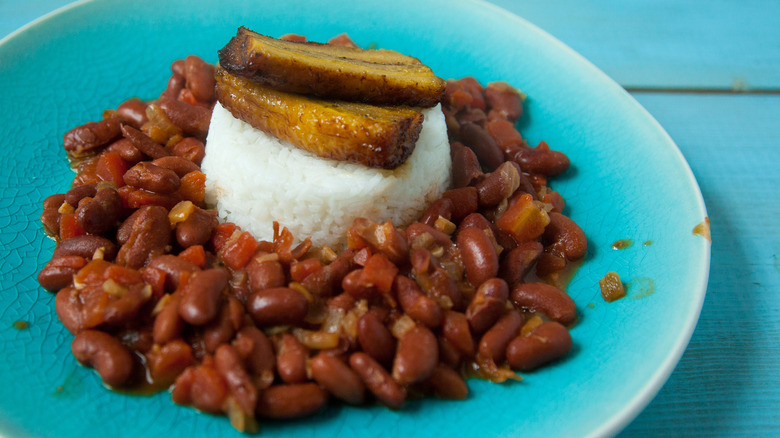
Shutterstock
Diabetes has become a real problem in the United States, according to the CDC. Approximately 30 million Americans are diabetic, with 90 to 95 percent of them having type 2 diabetes, which is the form that often develops due to poor eating practices. Additionally, diabetes can put you at risk for a host of health risks, such as loss of vision, heart disease, kidney disease, and more. So it's super important to make sure you're eating a healthy diet that's low in processed sugars.
If you just found out you're pre-diabetic, eating beans every day can help you get your levels in check, according to Allison Sattison, a registered dietitian. "The high fiber content and low glycemic index, along with the high protein content of legumes, helps prevent the unhealthy sugar spikes and plunges that, if not controlled, can lead to insulin resistance and uncontrolled diabetes," she explained in a since-removed interview with Indiana University Health. That's some good news for people who love to eat beans every day.
Already have diabetes? Eat beans every day

Shutterstock
While making beans a part of your daily diet can help you prevent type 2 diabetes, that's not all beans can do when it comes to the disease. That's because choosing to eat beans every day can also help you manage type 2 diabetes if you already have it, according to registered dietitian Joy Bauer. "Beans — including black, white, navy, lima, pinto, garbanzo, soy, and kidney varieties — contain a winning combination of high-quality carbohydrates, lean protein, and soluble fiber that helps stabilize your body's blood sugar levels and keeps hunger in check," she penned in an article forEveryday Health. "Beans are also inexpensive, versatile, and virtually fat-free."
As to what you should pair your beans with, Bauer has some recommendations. "If you're looking for foods that raise blood sugar levels slowly and gently, choose high-quality carbohydrates, such as brown or wild rice, instead of low-quality carbs like refined grains and sugary foods," she explained. She noted that adding a healthy fat is a good idea as well.
Your blood pressure may drop if you eat beans every day
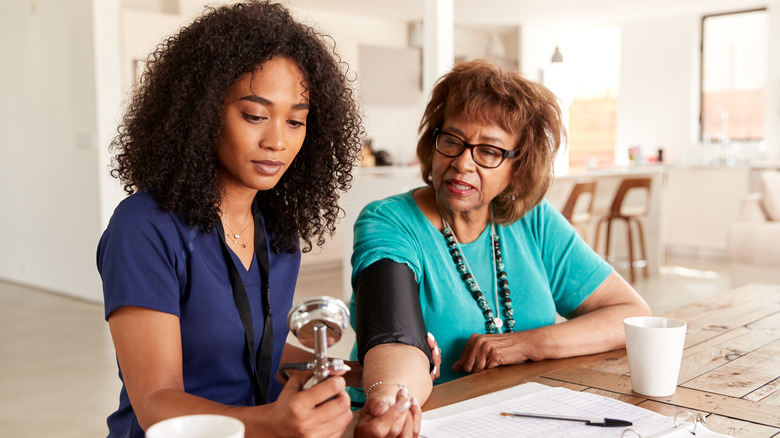
Shutterstock
According to the CDC, 75 million Americans have high blood pressure, which is one in three people — quite the staggering statistic. So if you're part of that population, consider eating beans every day in order to get your blood pressure under control, says Sandra Gultry, a registered dietitian. "Your blood pressure will drop because beans are rich in fiber, magnesium, and potassium, all of which help maintain healthy blood pressure levels," she revealed to The List. "Potassium helps counter the effects of rising sodium levels, which increase blood pressure." She added that the magnesium found in beans helps to support normal blood flow, which is good for your entire cardiovascular system.
The proof is in the pudding too, as Gultry noted there's been an abundance of scientific literature that links eating beans with lowered blood pressure. "Consistent research show that people who consumed one cup of beans and other legumes daily saw a drop in blood pressure," she shared, regarding people who eat beans every day.
You may pass more gas if you eat beans every day... at first
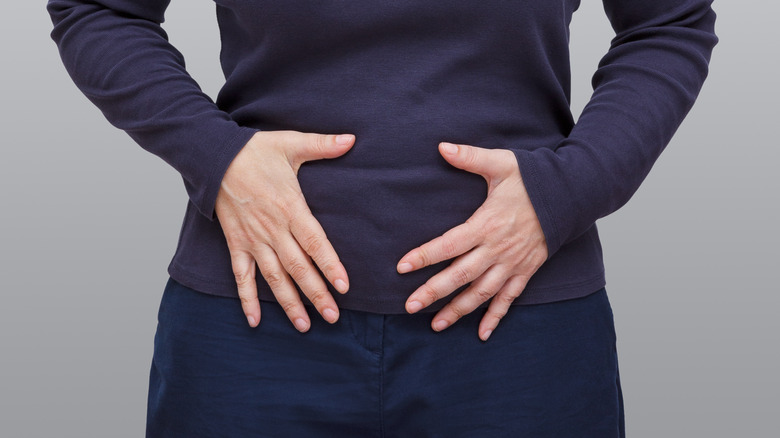
Shutterstock
Passing gas is a natural and healthy bodily function, despite the fact that it's often the topic of jokes, and often beans are a part of that humor. But according to registered dietitian Amanda A. Kostro Miller, there is some truth to the songs about tooting if you eat beans every day. "You may have more flatulence or abdominal discomfort because beans are typically high FODMAP foods," she shared with The List. "FODMAPs are specific substances in food that can cause flatulence, bloating and abdominal discomfort in certain people who are more sensitive to FODMAPs."
But that's not the case for most people who eat beans on a regular basis, says Dr. Patrick Quillin, a nutrition expert and former clinical nutritionist. "The person who has beans only at the annual company picnic probably thinks that beans create an overabundance of flatulence," he told The List. "But if you eat beans often, your microbiome obliges you by creating more enzymes to help digest beans properly."
If you eat beans every day, you may want to eat less meat
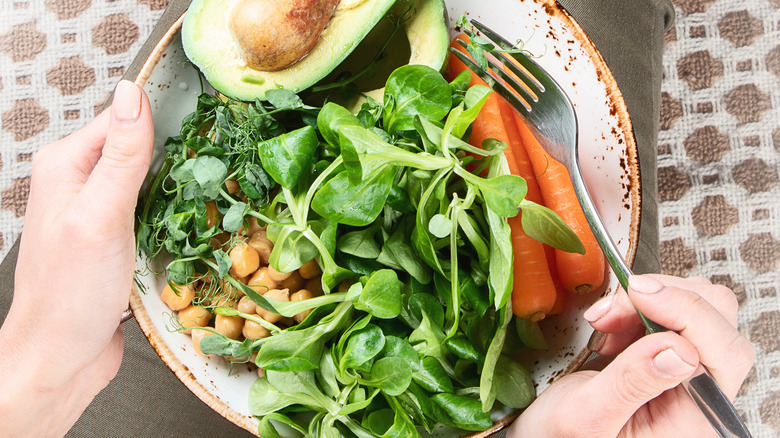
Shutterstock
If you're an omnivore, chances are you know just how tasty red meat can be. From bacon to meatloaf to chili con carne, meat is a delicious food that's full of iron and other nutrients, as noted byHealthline. However, eating too much red meat has been linked to some adverse health effects, such as heart disease, colon cancer, and kidney failure — yikes.
If hearing those statistics makes you eager to jettison the meatballs and the burgers and seek out healthy alternatives, choosing to eat beans every day can help you on that dietary journey, according to registered dietitian Sandra Gultry. "You will reduce meat intake because beans are a notable source of vegetarian protein," she explained to The List. "Beans are more than just a meat substitute, they are so nutritious that the latest dietary guidelines recommend we triple our current intake from one to three cups per week."
If you plan to give up beef, it helps to know what to expect. Here's what happens to your body when you stop eating meat.
Concerned about your iron levels? Try to eat beans every day
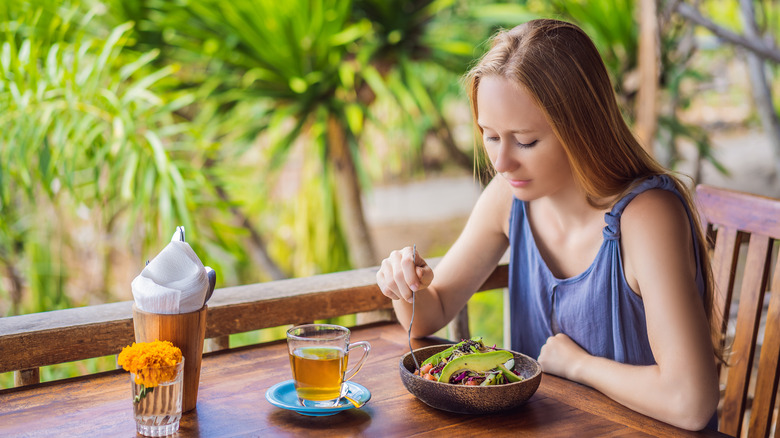
Shutterstock
Are you getting enough iron in your diet? Do you even know how much you should be getting? "Iron recommendations for males ages 19 to 50 is eight milligrams per day, and for women ages 19 to 50, it's 18 milligrams per day," registered dietitian Kylie Ivanir explained to The List. That means it's especially important for women to monitor their iron intake to make sure they're getting enough.
So what are some good ways to do that? While it's widely known that red meat is a good source of iron (via Healthline), if you're looking for good plant-based sources, look no further than beans, says Ivanir. "One cup of cooked black beans has four milligrams of iron," she continued. "However, iron from plants is a bit harder for our bodies to extract and use. So make sure to pair beans with a source of vitamin C, like fresh bell peppers, lemon, fresh tomatoes, or fresh broccoli." Who knew that you could boost your iron intake if you eat beans every day! And, as a bonus, beans are one of the foods that will give you a burst of energy, largely thanks to its iron.
If you eat beans every day, you may reduce your risk of cancer

Shutterstock
If there's one thing that literally no one wants to hear, it's that they're at risk of cancer or already have some form of cancer. That's despite the fact that plenty of Americans engage in risky behaviors that can cause cancer, such as smoking cigarettes and eating unhealthy foods, according to the American Cancer Society.
Fortunately not only is eating beans every day not a risky choice, but doing so can reduce your chances of developing cancer, according to Dr. Patrick Quillin, a nutrition expert and former clinical nutritionist. "Garbanzo and other beans have been shown to have potent anti-cancer activity," he revealed to The List. "Beans are an incredible addition to your anti-cancer diet. In longevity studies, scientists find that the more beans people eat, the lower their risk for cancer, heart disease, diabetes, and nearly any other condition you can imagine." In short, beans are downright good for you, and are an excellent tool in your arsenal against disease. Sounds like a good reason to eat beans every day.
You will become more regular if you eat beans every day
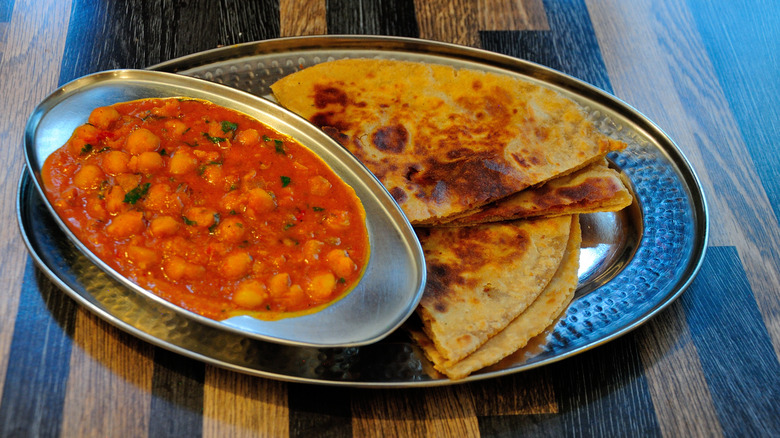
Shutterstock
According to a study in the American Journal of Lifestyle Medicine, only five percent of Americans eat enough fiber — which means a whopping 95 percent of Americans aren't getting enough of it. So if you're looking to get the daily recommended amount of fiber in your diet naturally, choosing to eat beans every day can help with that, says Kylie Ivanir, a registered dietitian. "The soluble fiber in beans adds bulk to your stool," she shared with The List. "This helps food travel down your intestine, stimulate a bowel movement, and keep you regular."
But don't go crazy and binge on beans, as eating too many of them too quickly can have adverse digestive impacts, as noted by registered dietitian Amanda A. Kostro Miller. "You actually may experience constipation, especially if you increase your bean content rather quickly," she told The List. "Even though fiber is a great thing, getting too much of it or adding in too much too quickly can constipate you. So, make sure you increase your water intake along with your bean intake."
If you eat beans every day, make sure to consume a variety of different kinds
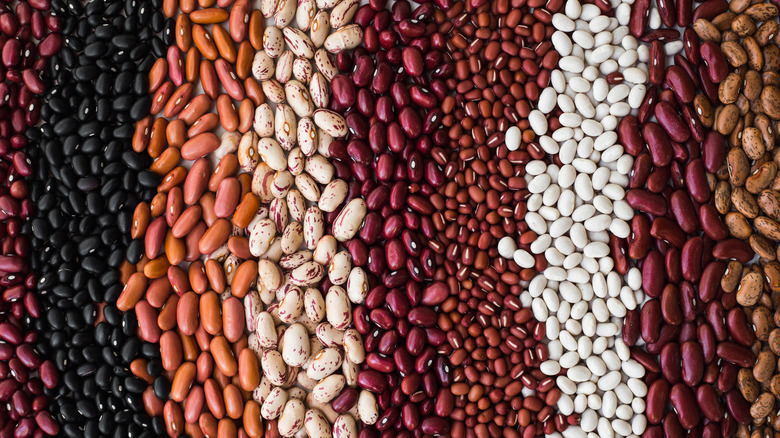
Shutterstock
Let's say you're in the habit of making a big pot of black beans and rice at the beginning of the week and rely on it for your lunch every day while you're at work. Or perhaps you have a favorite Indian restaurant that makes some amazing chana masala, so you grab that every day for dinner. That just means your bean game is going strong, right?
While eating beans is an excellent habit to get into, you'll want to change up the kinds of beans you're eating every week, according to Kylie Ivanir, a registered dietitian. The reason? "Each bean has different types of fibers that help maintain a healthy gut," she explained to The List. "A healthy gut is important for heart health and general health. In general, the more diversity of plants in your diet, the better." She added that each bean has different kinds of vitamins and minerals, making for another good reason to mix things up if you plan to eat beans every day.
So make sure you're changing out the kinds of beans you eat, and not just doing the same thing over and over again.
Should you rinse canned beans before you eat them?
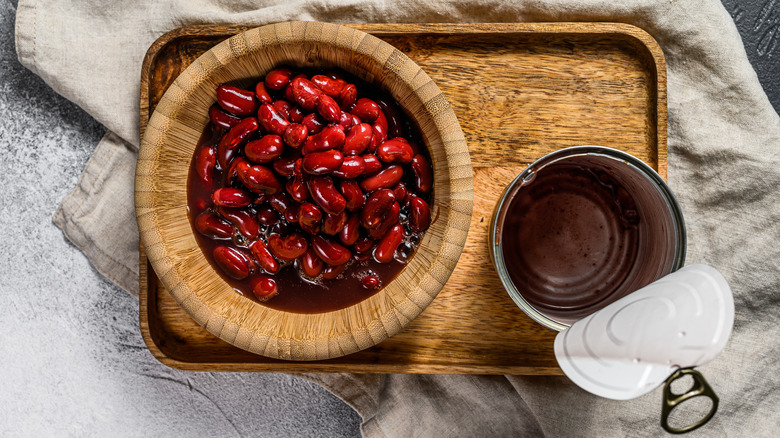
Shutterstock
Let's face it: not everyone has time to prepare beans from their dried form. To that end, canned beans can be a great alternative, saving you hours in the kitchen.
But should you rinse your canned beans, especially if you plan to eat beans every day? There are pros and cons, as noted by Diane McKay, PhD, an assistant professor at Tufts University. "Many recipes advise rinsing and draining canned beans, which reduces sodium (by 41%, on average, in one study)," she penned in Tufts'Health and Nutrition Newsletter. "However, some of the minerals beyond sodium and certain vitamins (such as folate and other B vitamins) that are soluble in water also leach into the liquid part of canned beans." So if you do rinse your canned beans, you may want to recoup the nutritional losses by adding extra veggies to your dish.
And if you don't rinse? "If you don't plan to rinse canned beans, such as if you're including the canning fluid in chili, stew or soup, it's especially wise to buy reduced-sodium beans," McKay continued. That's because beans that are specifically labeled "reduced sodium" can have about 25 percent less sodium than their other canned counterparts.
Believe it or not, there are some risks if you eat beans every day
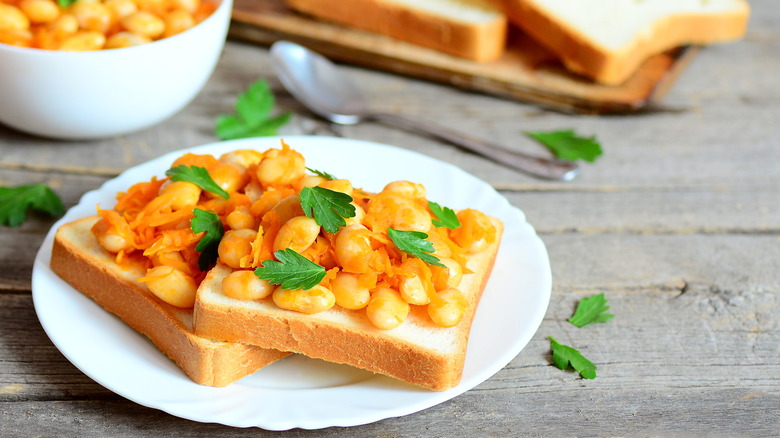
Shutterstock
With all of the healthy benefits you reap from choosing to eat beans every day, it's hard to imagine that they could be bad for you in any capacity. But according to an article in The Healthy, certain people need to be careful when it comes to their bean consumption.
For one, some people may find themselves having migraines after eating beans because of the tyramine present in them. Additionally, if you take a monoamine oxidase (MAO) inhibitor to treat depression, keep fava beans off of your shopping list as they can raise your blood pressure. And if you're someone who suffers from gout, you should avoid beans as they can trigger an attack due to their high purine content.
Finally, some beans, such as soybeans, may contain substances that can mess with your ability to absorb vitamins and beta-carotene. The risk isn't huge, but it's never a bad idea to add green veggies and fresh fruit to your diet just in case. And as always, talk to your doctor to be sure.
Source: https://www.thelist.com/183292/when-you-eat-beans-every-day-this-is-what-happens-to-your-body/